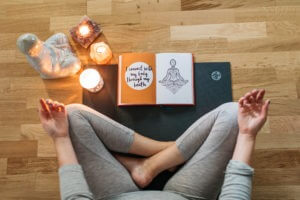How to Journal for your Wellbeing

Writing can help us hear ourselves more clearly. Read on to find out how to journal and start a regular habit.
I’m sure I’m not alone when I say the world feels overwhelming right now. The effects of lockdown on our mental health are well documented and going to be felt long after life has moved on to a new kind of normal. That’s why it’s so important for us to take time for our mental wellbeing and using journaling as a tool for managing our feelings and anxieties can be a real life-saver.
Journaling is pretty much a constant for Finn and me. So much of our mental wellbeing is wrapped up in it and our books are testament to that. Understandably, many people shy away from it, thinking the most they ever do is write a shopping list or birthday card and that they just don't know how to journal, but I’ll let you into a secret: you don’t need to be a writer to journal. In fact, you're the most qualified person to do it!
I posted a step-by-step guide to Writing for Wellbeing on IGTV recently as I wanted to show you journaling's not as complicated as it sounds. If you’ve seen the video and would like to learn more, read on - this blog post delves a little deeper into how to get started and what regular writing can do for your soul.
So why do it?
The benefits of journaling are extensive - from stretching your IQ and improving confidence, to evoking mindfulness and achieving goals. For me, it’s how I get to know myself better. Journaling gives us a space to voice things that we might never normally say out loud, whether that’s dreams we’re exploring or having a good old rant! We all know how good it feels to sit with a friend over coffee and talk things out, don’t we? Well, think of journaling as something similar.
There’s a very interesting scientific side to it, which psychotherapist and journaling expert Maud Purcell, explains: “The act of writing accesses the left brain, which is analytical and rational. While our left brain is occupied with writing, our right brain is free to create and intuit. In this way, writing removes mental blocks and allows us to use both parts of our brain for deeper self-exploration.”
On top of this, research by social psychologist James W. Pennebaker has shown that expressive writing can have a very real effect on our physical wellbeing and actually reduce the number of visits made to a doctor for physical ailments.
How to journal: Getting started
To be honest, it couldn’t be easier than picking up a pen and piece of paper. Of course, there’s a bit more to it than that, but it doesn’t need to be difficult or complicated.

The most important things you need are time and space. This isn’t something you can do while home-schooling and cooking dinner! Make sure you’re comfortable and won’t be interrupted - try journaling first thing in the morning before you start your day or last thing at night. I’ve learnt it helps me if I make it a ritual - I find a cosy, comfortable seat, light a candle, make a tea or grab a glass of wine and then it’s as easy as WRITE:
- W - What do you want to write about? What’s on your mind? If you’re not sure where to start, take a look at the Prompts on our Instagram or try our free downloadable PDF My Positive Morning Ritual for a good introduction to making this a regular start to your day.
- R - Reflect on how you respond to the prompt. What are your thoughts and emotions? What comes to mind? Stay in the present and use ‘I’ sentences: I think, I feel, I know and use words that connect with the now: today, right now, in this moment.
- I - Investigate what you’re feeling. Start writing and just let it flow. If you lose your way, look back on what you’ve written and respond to that, too. Listen to your writing voice and notice everything.
- T - Time yourself. This is an important one. Knowing I have a time limit gives me a little nudge of urgency and helps the process become more of a brain drain. I find 5-15 minutes works well.
- E - Exit smart. When you’re done, re-read what you’ve written and see how it makes you feel. See if you can summarise it. Has the time helped you with a goal or decision? Do you need to make an action list?
Housekeeping
There’s no right or wrong way to journal, but there are a few things to think about to ensure you get the most out of the experience.
- Be honest. There’s no point doing this if you’re going to edit yourself. If you find you’re not being authentic, don’t do it, or perhaps more interestingly, ask yourself why you’re behaving this way. Remember, you’re only doing this for you and no one’s going to read your words. If you are worried someone will find them, destroy them when you’re finished. This also helps if you’re trying to let go of something.
- Forget perfectionism. We’re not aiming for beauty here! Don’t worry about your handwriting, spelling or grammar. Just let the words flow as easily and quickly as you can.
- Get the mindset. Start by meditating or doing a quick body scan and create a ritual around your writing. The more often you do this, the more it’ll come naturally. If you lose momentum, close your eyes and take a breath to bring yourself back.
- Be responsible. This can raise hard topics so you might want to check in with a friend afterwards or if you have one, talk to your therapist about it as there may be some issues you aren’t ready to tackle on your own just yet.
- Make it yours. I’ve centred this around writing, but maybe words aren’t your thing. This is connected to creativity, so find a way of journaling that speaks to you. It doesn’t have to be pen and paper - there are so many other ways you can voice your emotions: make it digital, record yourself, draw, collage or use photography! The most important thing is that it’s yours and it motivates you.
So there you have it, my tips on how to journal and start a habit. Why not take 10 minutes now? An easy way to begin might be to ask yourself: How has lockdown been for me? Think about how you’ve been feeling, what you’ve been doing, how you’ve been coping. Start with some describing words and let it flow. When you’re done, take a look back and try to see what you can take away from it.
Journaling can be hard, but the positive effects can be endless if you harness it as a real tool, a form of therapy to offload, unpack and go inward.
Much love, Ali x








1 Comment
I absolutely love journaling. It’s like I have my own place to share my thoughts and feelings. 🙂 📝💟👍🏻🤠❤️💗☕️👱🏼♀️📔📚